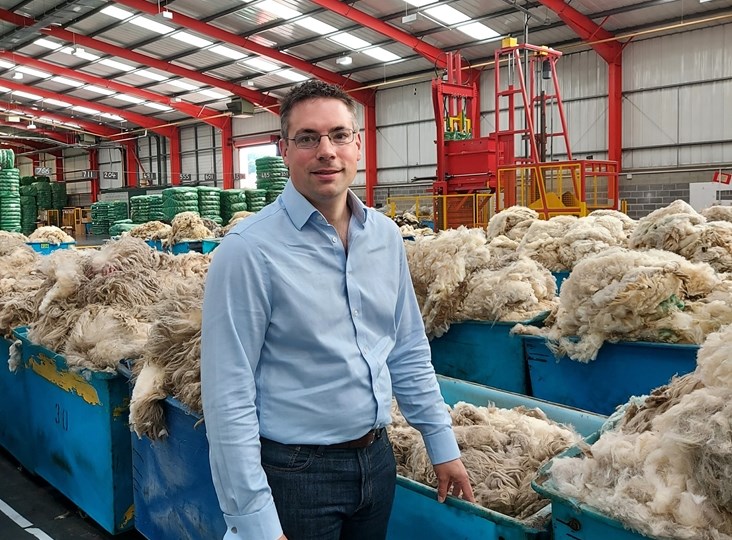Q&A with CEO of Ulster Wool, Andrew Hogley
Recently appointed CEO of Ulster Wool, Andrew Hogley discusses the future of our fantastic fibre and his vision for your organisation.
Q: As CEO of Ulster Wool, what areas of the organisation are you involved in day to day?
A: Driving demand for wool and improving the price we achieve for it on behalf of our members is my number one priority. To this end I am involved in wool sales through the planning and management of the auctions, engagement with both the merchants that buy in our auctions and the end users that manufacture a wide range of products from our fantastic fibre. I also oversee other areas of business including operations and producer services and engage with wider stakeholders including the Campaign for Wool, Farming Unions, the National Sheep Association and DAERA.
Q: What are Ulster Wool’s key priorities and challenges?
A: Stimulating demand in order to achieve better prices for our members is the key priority for Ulster Wool. There are however significant structural challenges for the UK wool industry that we need to work to overcome in order to achieve this.
Undoubtedly the biggest challenge we face is that wool is traded as a global commodity and that most manufacturers buy yarn at lowest cost without specifying the origin of the wool. To overcome this we need to continue to build the brand so that wool, sourced through our grading network and auctions, is specified by the end users.
Commercial processing of wool is another key challenge. We are very fortunate to still have two commercial scouring plants in the UK. The plants in Bradford and Dewsbury are however the only scouring plants in Europe that can commercially process the UK clip. A third plant in Czech processes some of our finer combing wools but does not handle our coarser wool types. Without these plants we would be in the same predicament as the wool growers in the Southern Hemisphere that are reliant on the Chinese market for wool processing.
In order to be economically viable the scouring plants process wool in high volume. A typical batch would be 50,000kg and to achieve this they need wool of consistent character and quality. It is for this reason that the collective marketing is essential if producers are to maximise the value of their wool. Ulster Wool grades the wool and amalgamates it into lots of consistent quality in commercial weights. Our standard auction lots are just over 8 tonnes of a single type. The average clip weight we handle is approximately 350kg and this will usually comprise wool of at least ten grades. One auction lot may combine the wool from more than 100 producers. Processing smaller quantities has a high cost.
Our business with its network of collection sites and depot has significant fixed costs and we need to spread these over as large a weight of wool as possible in order to maximise the returns for our producers. Put simply the more wool we handle the lower our handling cost per kilo and the more we can return to all producers. We also need the support of our members to maximise the volume of wool we receive.
Q: Do you think the demand of certain wool types from manufacturers will change as new products develop?
A: We grow a fantastic range of wool types. At one end of the spectrum we have Bluefaced Leicester and Shetland wools with fibre diameters in the mid 20s micron range and at the other end we have incredibly hard wearing coarse wools such as Rough fell, Herdwick and Welsh Mountain. The variety of wool grown can be used in an incredibly wide range of products from; bedding and mattresses, to knitwear and tweed, transport fabrics for buses and trains, carpets and insulation. It is therefore crucial that Ulster Wool works to stimulate demand across the full range of wool types.
We are also working with industry and universities to find innovative new uses for our product. We want to work with partners in this area to explore new opportunities and promote innovation. Promising opportunities include the use of wool in biodegradable tree guards. Such products could provide new markets for lower value wool types.
Q: What do you think makes Northern Ireland wool stand out from other fibres and wool from overseas?
A: Wool is a fantastic sustainable, environmentally friendly product which has the potential to shine as the backlash against manmade fibres and micro plastics grows. The quality and consistency of Ulster Wool’s grading coupled with the UK’s rich heritage of wool processing and manufacturing also provides a compelling story for the consumer.
Q: What is on the cards for Ulster Wool over the next 12 months?
A: As the economy recovers from the pandemic and the hospitality sector reopens we see a bright future ahead for Ulster Wool. Our stockpile from 2019 has now been cleared and we see increased interest in our product. To support this recovery we must focus on driving demand with initiatives such as our e-commerce site and working collaboratively with processors and manufacturers.
Back to News & Events Andrew Hogley, CEO of Ulster Wool
Andrew Hogley, CEO of Ulster Wool 